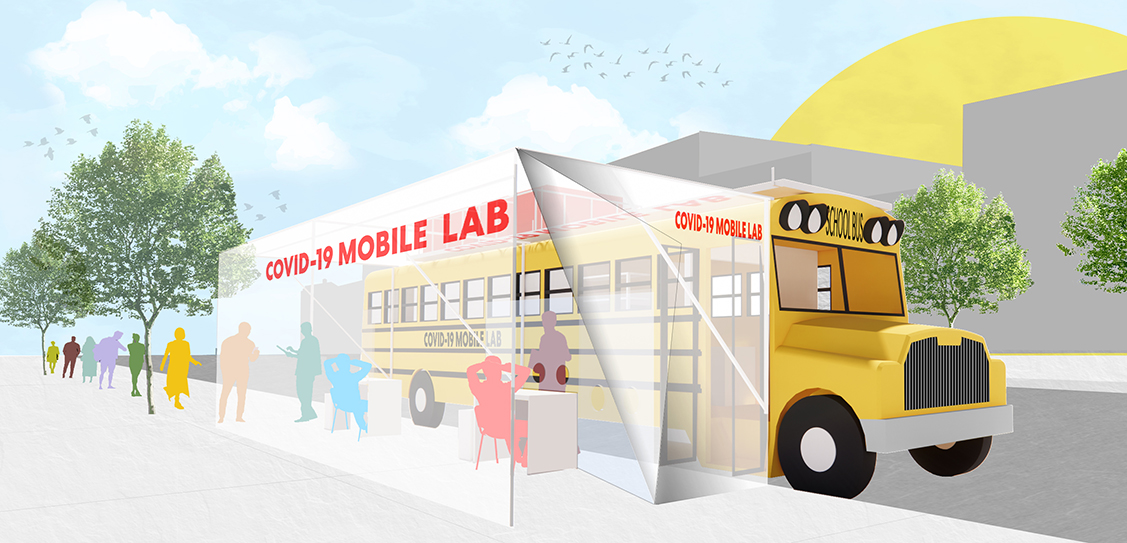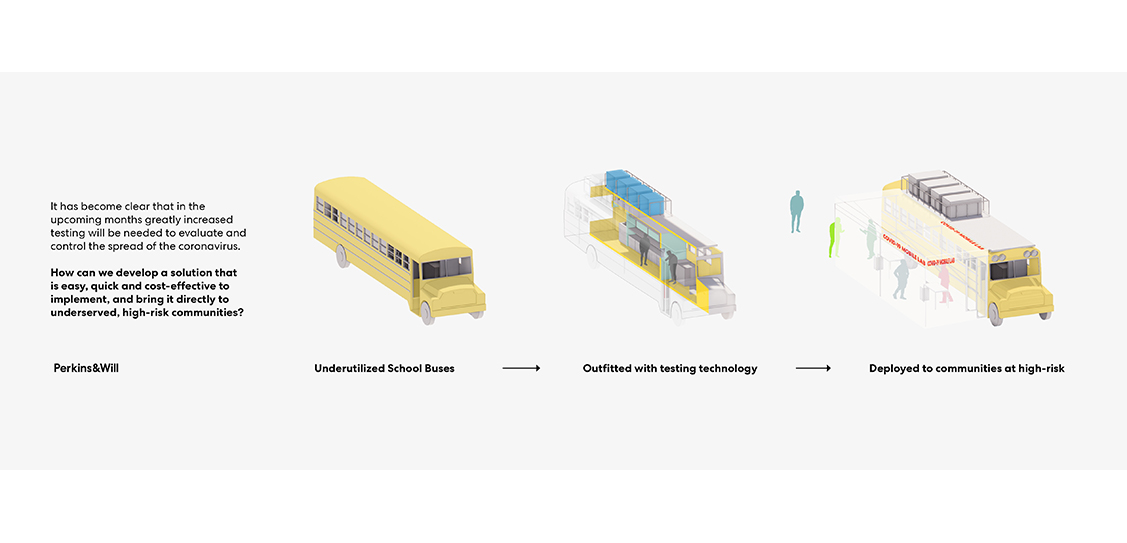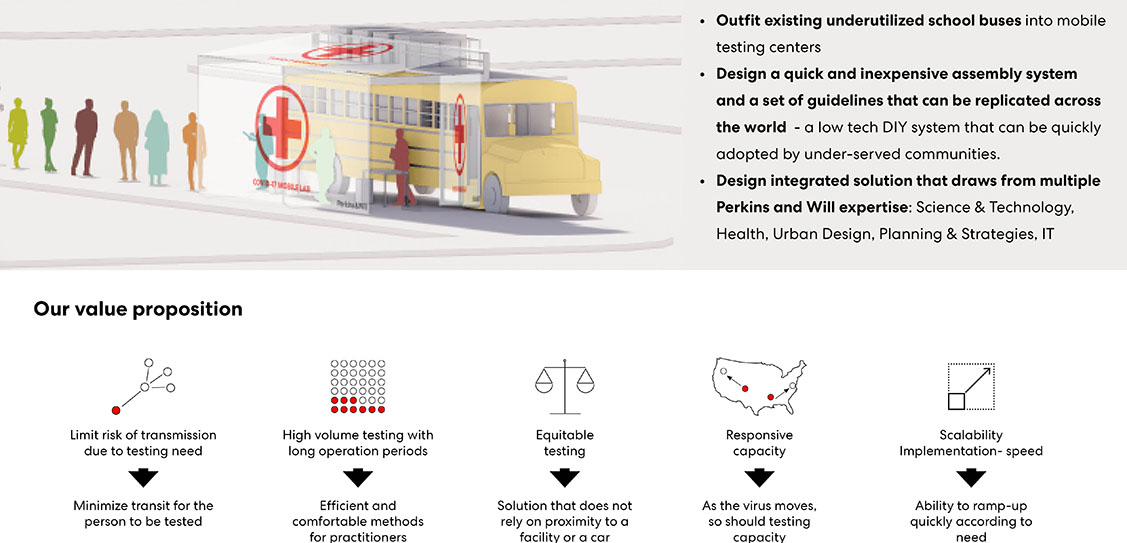A scalable solution for increased testing capacity within high-density and under-served neighborhoods has been developed in New York.
In response to the urgent need for more widespread and rapid Covid-19 testing, Perkins and Will's New York studio - along with its Denmark studio Schmidt Hammer Lassen Architects, and in partnership with multi-disciplinary design group Arup - has designed a plan to retrofit out-of-use school buses into mobile testing labs.
The plan is scalable, quick, inexpensive, and easily replicated for worldwide adoption.
As the world battles one of the worst global health crises of recent memory, public health experts agree that insufficient testing and significant lag times for test results are limiting the ability to treat and track the spread of the virus.
Additionally, around the world, under-served, lower-income and homeless populations are being disproportionately impacted, both economically and medically, by Covi-19 and face greater challenges in accessing testing and treatment.
Mobile testing labs would help address these existing inequities, reduce the risk of contamination en route to or at a larger medical facility, and put to good public use a fleet of currently idle school buses across the US.
While no one is immune to the Covid-19 virus, testing and treatment is not a level playing field. It is the under-served communities, including lower-income and homeless populations, that need our urgent help at this time.
We wanted to harness the expertise of our interdisciplinary team to help those in need during the crisis. We believe the mobile testing lab is a scalable and accessible solution to close the gap on testing in our home, New York City, and across the world.
Multiple disciplines for a singular solution
The concept of the COVID-19 mobile testing lab was informed by Perkins and Will’s expertise in science and technology, healthcare, urban planning, planning and strategy, and IT. The firm’s Denmark studio, Schmidt Hammer Lassen Architects, lent expertise specifically in industrial design.
And the firm’s Innovation Incubator program, which awards research grants to staff seeking design solutions to real-world problems, allows the team to continue enhancing the plan.
The team identified seven key parameters to guide the design process: equitability, mobility, accessibility, speed, flexibility, ease of implementation, and scalability.
Retrofitting under-utilized school buses into testing centers met the team's criteria, offering a solution that could be adopted on a national and potentially even global scale.
As we've been closely watching the evolving circumstances surrounding the COVID-19 pandemic, we've had the opportunity to look at the international response and learn from other countries.
While the concept of widespread testing is at the forefront of many countries’ efforts to curb COVID-19, there remain substantial inequities of access to testing that we are attempting to address in this approach.
Open-source design
Perkins and Will based the layout of the mobile testing lab concept around the newly-approved Abbott ID NOW COVID-19 test, enabling vulnerable populations and isolated groups to be tested and receive their results within minutes.
Ideally, individuals would be referred to the mobile testing lab through doctors and appointments would be made through a mobile app, so that crowds could be controlled and social distancing rules adhered to.
Of course, given the testing solution’s emphasis on equitability, smartphone access or a referral from a doctor is not a pre-requisite and everyone is welcome to sign-up.
Upon arrival, individuals are greeted by technicians behind a plexiglass shield underneath a canopy.
Following a brief check-in process, the technician would take a sample using a swab from the individual's nose and/or throat.
Their samples would then be labeled or barcoded and brought into a lab environment on the bus via a pass-through box.
The labs would host two technicians who would run the samples collected through the ID NOW rapid testing instrument.
Once results are received, they would be recorded and uploaded to the federal government's official database.
Tested samples and the expended test materials would then be placed in biohazard waste bags and discarded safely.
For tested individuals with mobile app access, results would be sent through a phone notification. For those without, results could be relayed verbally.
Once the Perkins and Will team developed the prototype for the lab, they invited their industry colleagues at Arup to design the project’s companion app.
We aim to bring together intuitive technology and service design into a unique mobile care space.
Through rapid prototyping, we can better learn and refine how we get people through the process and give communities the confidence to return to normal.
Built off the shelf
Every element of the mobile testing lab, including the generators, HVAC systems, and the awnings, is designed to be sourced from off-the-shelf from vendors, ensuring easy replicability across communities.
To support lab technicians, the rear of the bus could include a respite area, a gravity-based hand washing sink, a refrigerator for water and lunches, seating, and storage options for personal protective equipment.
In addition, a clean flow process could be implemented, and a negative air pressure system created, to minimize the risk of environmental contamination within the lab space.
Generators could be placed on top of the bus to provide electricity.
Design innovation
The Covid-19 mobile testing lab is supported by the Perkins and Will Innovation Incubator program, an important part of the firm’s culture of curiosity and research.
For the last 10 years, Innovation Incubator has encouraged firmwide creative thinking and problem-solving by awarding micro research grants to staff who wish to investigate design solutions to various challenges, from social equity to technical issues.
The results consistently improve the firm’s ability to serve its clients and communities and contribute to the knowledge base of the design profession at large.
The future
Perkins and Will is actively looking for additional project partners while also sharing the concept freely.
In doing so, the firm hopes to maximize collective efforts to close the gap for Covid-19 testing.
In the future, these mobile testing labs could also offer antibody testing, or administer vaccines - once discovered and approved - to society's most vulnerable populations.



